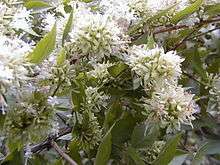Abelia
Abelia /əˈbiːliə/[1] is a formerly recognized genus that contained about 30 species and hybrids, placed in the honeysuckle family, Caprifoliaceae. Molecular phylogenetic studies showed that the genus was not monophyletic, and in 2013, Maarten Christenhusz proposed the merger of Abelia (excluding section Zabelia) into Linnaea, along with some other genera. Abelia section Zabelia was raised to the genus Zabelia.[2]

Description
Species formerly placed in Abelia are shrubs from 1–6 m tall, native to eastern Asia (Japan west to the Himalaya) and southern North America (Mexico); the species from warm climates are evergreen, and colder climate species deciduous. The leaves are opposite or in whorls of three, ovate, glossy, dark green, 1.5–8 cm long, turning purplish-bronze to red in autumn in the deciduous species. The flowers appear in the upper leaf axils and stem ends, 1-8 together in a short cyme; they are pendulous, white to pink, bell-shaped with a five-lobed corolla, 1–5 cm long, and usually scented. Flowering continues over a long and continuous period from late spring to fall.
Some of these species are cultivated as ornamental garden plants, and may still be described as Abelia in horticultural listings. A notable example is the hybrid Abelia × grandiflora (now Linnaea × grandiflora).
Taxonomy
The generic name commemorates Clarke Abel, a keen naturalist who accompanied Lord Amherst's unsuccessful embassy to China in 1816 as surgeon, under the sponsorship of Sir Joseph Banks. All of Abel's seeds and plants were lost in a shipwreck on the homeward voyage, however; living plants of Abelia chinensis (now Linnaea chinensis) were first imported to England in 1844 by Robert Fortune.[3]
Some species placed in Abelia were transferred to Linnaea at various times from 1872 onwards, but these transfers were not accepted by most botanists. Molecular phylogenetic studies showed that a number of genera traditionally placed in the tribe Linnaeeae were closely related, but that Abelia was not monophyletic, even with Abelia section Zabelia split off as a separate genus Zabelia. In 2013, Maarten Christenhusz proposed that Abelia and related genera be merged into Linnaea.[2] This proposal has been adopted by recent sources, including the Plants of the World Online.[4][5]
Allergenicity
Abelia has an OPALS allergy scale rating of 5, indicating moderate potential to cause allergic reactions, exacerbated by over-use of the same plant throughout a garden.[6] People allergic to honeysuckle may experience cross-reactive allergic reactions with Abelia.[6]
Symbolism
The Abelia is symbolic for equality in some parts of Mexico
Former species and synonyms
Species and synonyms previously placed in Abelia but now placed in other genera include:[7]
- Abelia adenotricha = Lonicera elisae
- Abelia aitchinsonii = unplaced
- Abelia angustifolia = Zabelia angustifolia
- Abelia anhweiensis = Zabelia dielsii
- Abelia aschersoniana = Linnaea chinensis
- Abelia biflora = Zabelia biflora
- Abelia brachystemon = Zabelia brachystemon
- Abelia buchwaldii = Linnaea serrata
- Abelia buddleioides = Zabelia buddleioides
- Abelia cavaleriei = Linnaea chinensis
- Abelia chinensis = Linnaea chinensis
- Abelia chowii = unplaced
- Abelia coreana = Zabelia dielsii
- Abelia coriacea = Linnaea coriacea
- Abelia corymbosa = Zabelia corymbosa
- Abelia curviflora = Linnaea spathulata
- Abelia davidii = Zabelia biflora
- Abelia deutziifolia = Linnaea engleriana
- Abelia dielsii = Zabelia dielsii
- Abelia engleriana = Linnaea engleriana
- Abelia fargesii = unplaced
- Abelia floribunda = Linnaea floribunda
- Abelia gracilenta = Linnaea forrestii
- Abelia graebneriana = Linnaea engleriana
- Abelia × grandiflora = Linnaea × grandiflora
- Abelia grandifolia = Linnaea grandifolia
- Abelia gymnocarpa = Linnaea serrata
- Abelia hanceana = Linnaea chinensis
- Abelia hersii = Zabelia dielsii
- Abelia hirsuta = Linnaea floribunda
- Abelia insularis = Zabelia biflora
- Abelia integrifolia = Zabelia integrifolia
- Abelia ionandra = Linnaea chinensis
- Abelia ionostachya = Linnaea spathulata
- Abelia koehneana = Linnaea engleriana
- Abelia lipoensis = Linnaea chinensis
- Abelia longituba = Linnaea parvifolia
- Abelia macrotera = Linnaea macrotera
- Abelia mairei = Linnaea parvifolia
- Abelia mexicana = Linnaea mexicana
- Abelia microphylla = Linnaea forrestii
- Abelia mosanensis = Zabelia tyaihyonii
- Abelia myrtilloides = Linnaea parvifolia
- Abelia occidentalis = Linnaea occidentalis
- Abelia onkocarpa = Zabelia onkocarpa
- Abelia parvifolia = Linnaea parvifolia
- Abelia rupestris = Linnaea chinensis
- Abelia sanguinea = Linnaea spathulata
- Abelia schischkinii = Linnaea parvifolia
- Abelia schumannii = Linnaea parvifolia
- Abelia serrata = Linnaea serrata
- Abelia shikokiana = Zabelia biflora
- Abelia spathulata = Linnaea spathulata
- Abelia speciosa = Linnaea floribunda
- Abelia splendens = Lonicera fragrantissima
- Abelia tereticalyx = Linnaea parvifolia
- Abelia tetrasepala = Linnaea tetrasepala
- Abelia tomentosa = Linnaea serrata
- Abelia tyaihyonii = Zabelia tyaihyonii
- Abelia umbellata = Zabelia umbellata
- Abelia uniflora = Linnaea uniflora
- Abelia verticillata = Linnaea parvifolia
- Abelia zanderi = Zabelia dielsii
References and external links
| Wikimedia Commons has media related to Abelia. |
- Sunset Western Garden Book. 1995. pp. 606–607.
- Christenhusz, Maarten J.M. (2013), "Twins are not alone: a recircumscription of Linnaea (Caprifoliaceae)", Phytotaxa, 125 (1): 25–32, CiteSeerX 10.1.1.397.846, doi:10.11646/phytotaxa.125.1.4
- Alice M. Coats, Garden Shrubs and Their Histories (1964), 1992, s.v. "Abelia".
- "Linnaea", Plants of the World Online, Royal Botanic Gardens, Kew, retrieved 2018-01-22
- "Beauty bush (Linnaea amabilis)". iNaturalist. California Academy of Sciences. Retrieved 2018-01-22.
- Ogren, Thomas Leo (2000). Allergy-Free Gardening. Berkeley, California: Ten Speed Press. ISBN 1580081665.
- "Abelia", Plants of the World Online, Royal Botanic Gardens, Kew, retrieved 2018-01-23